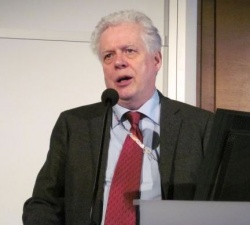To survive radiologists must become visible and valued
Radiologists work in dark, strange places often hidden in the basement of hospitals. Few doctors or medical staff visit these labyrinths, and for good reason.

The space is designed to be unfriendly to visitors and even dangerous with the humming sounds of irradiating machines.
"We were called the Photo Department, it is our heritage and it is still with us today," said Jim A. Reekers of the Department of Radiology at the Academic Medical Center of the University of Amsterdam.
Remaining invisible to colleagues and patients is the route to extinction for the profession, Reekers preached as chairman of a session promoting "The Visibility Of The Radiologist" at the European Congress of Radiology.
Another error is continuing to insist that radiologists are generalists.
“We told colleagues that a radiologist can read any image, we taught them that radiology is a general skill," said Reekers. "If they believe we are all alike then we become a commodity, and commodities are only traded on price."
Challenged to reorganize their departments, radiologists take a final fatal step when they follow exclusively the path toward efficiency and fast reporting. "You go this way and you will be not only invisible but eradicated," warned Reekers.
Basing the radiology department only on an economic model that maximizes patient throughput and efficiency leads to teleradiology and image interpreters. Teleradiology is an extreme example of separating radiologists from the hospital and further erasing their role as medical professionals. Training staff to read images suggests that the medical skills and specialized abilities of a radiologist can be replaced.
"In two or three years it actually works, these interpreters can be even better than radiologists," he said. The way forward to strengthen the role of radiologists seems counterintuitive and certainly runs against the heritage of isolated departments in basements.
Promoting the model of a spider's web Reekers showed how decentralization of the department, dispersal of specialists throughout the hospital and opening access to both doctors and patients opens a path to a more vigorous and visible role for radiologists.
His advice ranged from the strategic to the practical.
Create Clinical Diagnostic Units, for example, in order to connect with specialists.
"Build relationships with practice groups, chest radiology experts with chest surgeons, pediatric specialists linked with pediatricians. Become part of their scientific work," he counseled.
Do not forget the patients, he said. Today only interventional radiologists and mammographers have direct contact with patients. Change this, become part of the decision-making process, open communication channels, interact with patient interest groups he urged colleagues.
"Let the patients know who you are and that you are a doctor," he said.
Set up a website offering patient safety information and advice, and above all, don't hesitate to provide contact information.
08.03.2013





